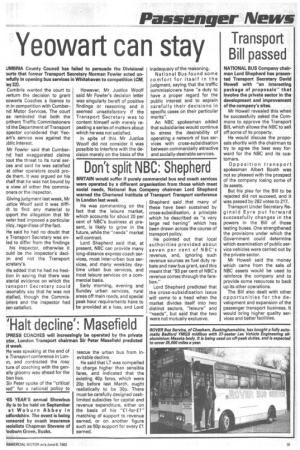Don't split NBC: Shepherd
Page 13

If you've noticed an error in this article please click here to report it so we can fix it.
BRITAIN would suffer if purely commercial bus and coach services were operated by a different organisation from those which meet social needs, National Bus Company chairman Lord Shepherd warned the Chartered Institute of Transport Transport conference In London last week.
He was commenting on the fact that the leisure market, which accounts for about 20 per cent of NBC's business at present, is likely to grow in the future, while the "needs" market will contract.
Lord' Shepherd said that, at present, NBC can provide many long-distance express coach services, most inter-urban bus services, and many weekday daytime urban bus services, and most leisure services on a commercial basis.
Early morning, evening and Sunday urban services, rural areas off main roads, and special peak hour requirements have to be provided at a loss, and Lord Shepherd said that many of these have been sustained by cross-subsidisation, a principle which he described as "a very large red herring" which has been drawn across the course of transport policy.
He pointed out that local authorities provided about seven per cent of NBC's revenue, and, ignoring such revenue sources as fuel duty rebate and new bus grant, said this meant that "93 per cent of NBC's revenue comes through the farebox."
Lord Shepherd predicted that the cross-subsidisation issue will come to a head when the market divides itself into two distinct sectors, "leisure" and "needs", but said that the two were not mutually exclusive.


























































